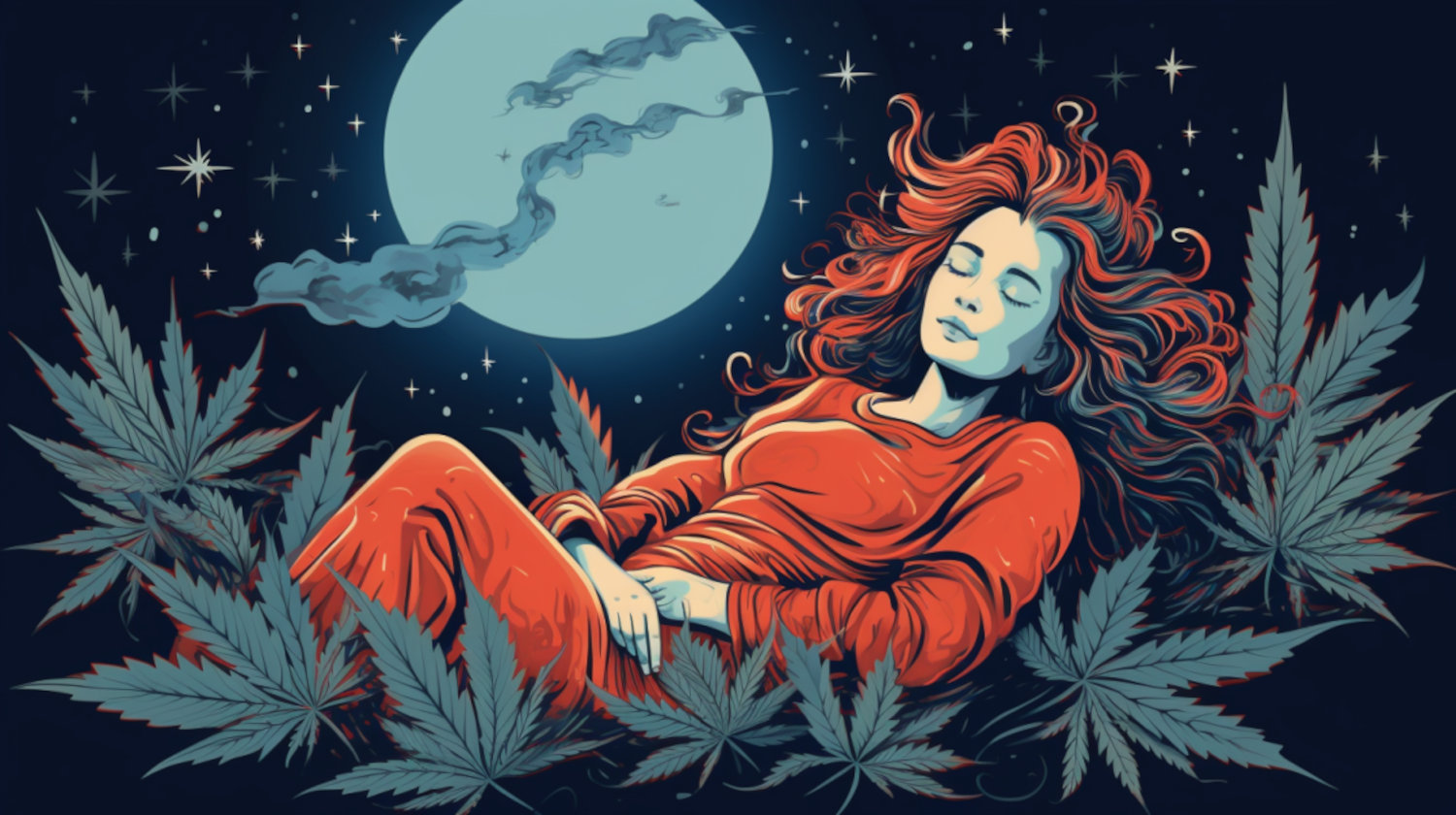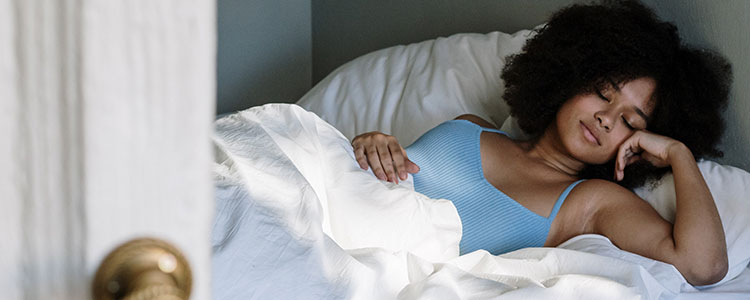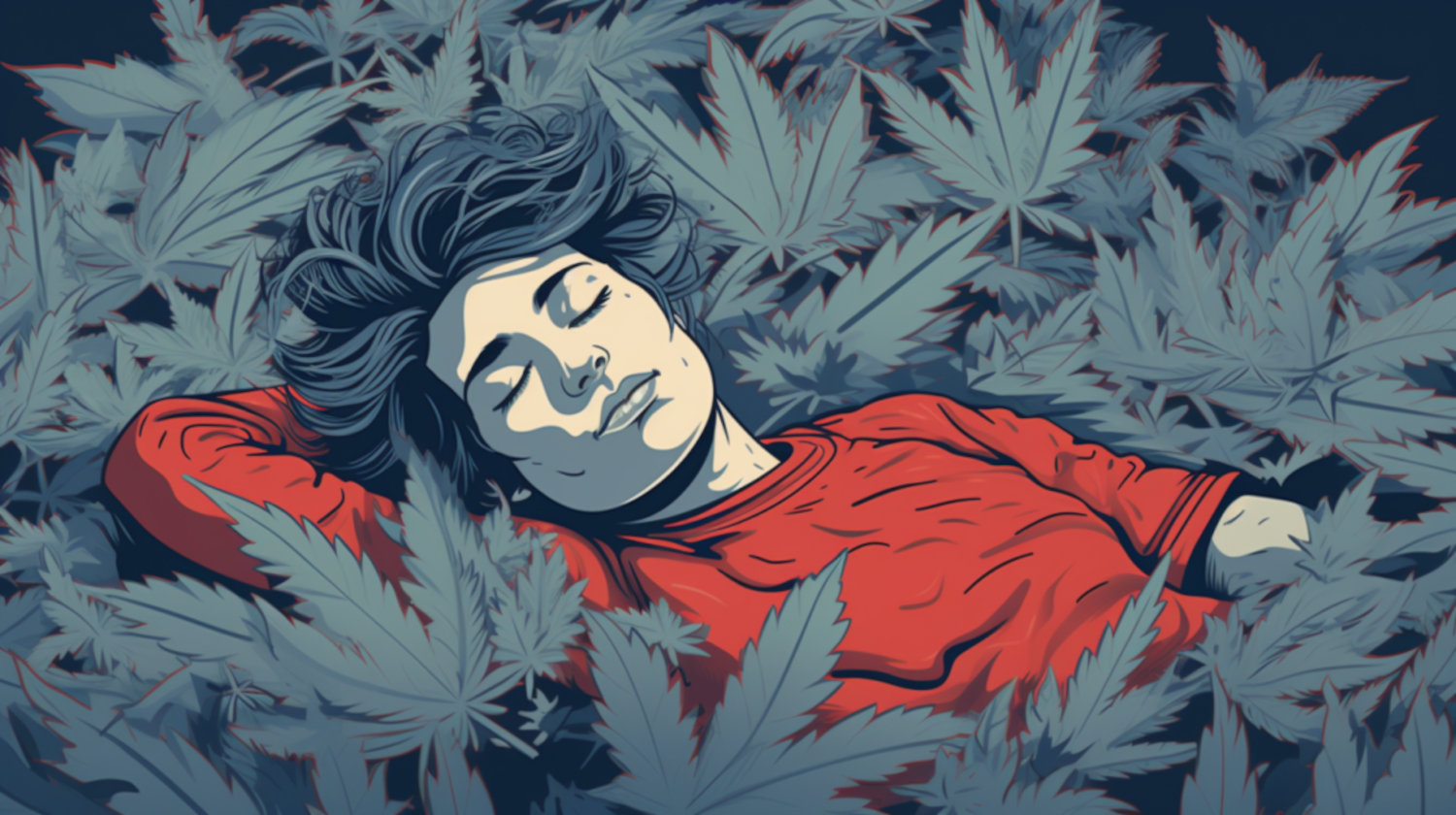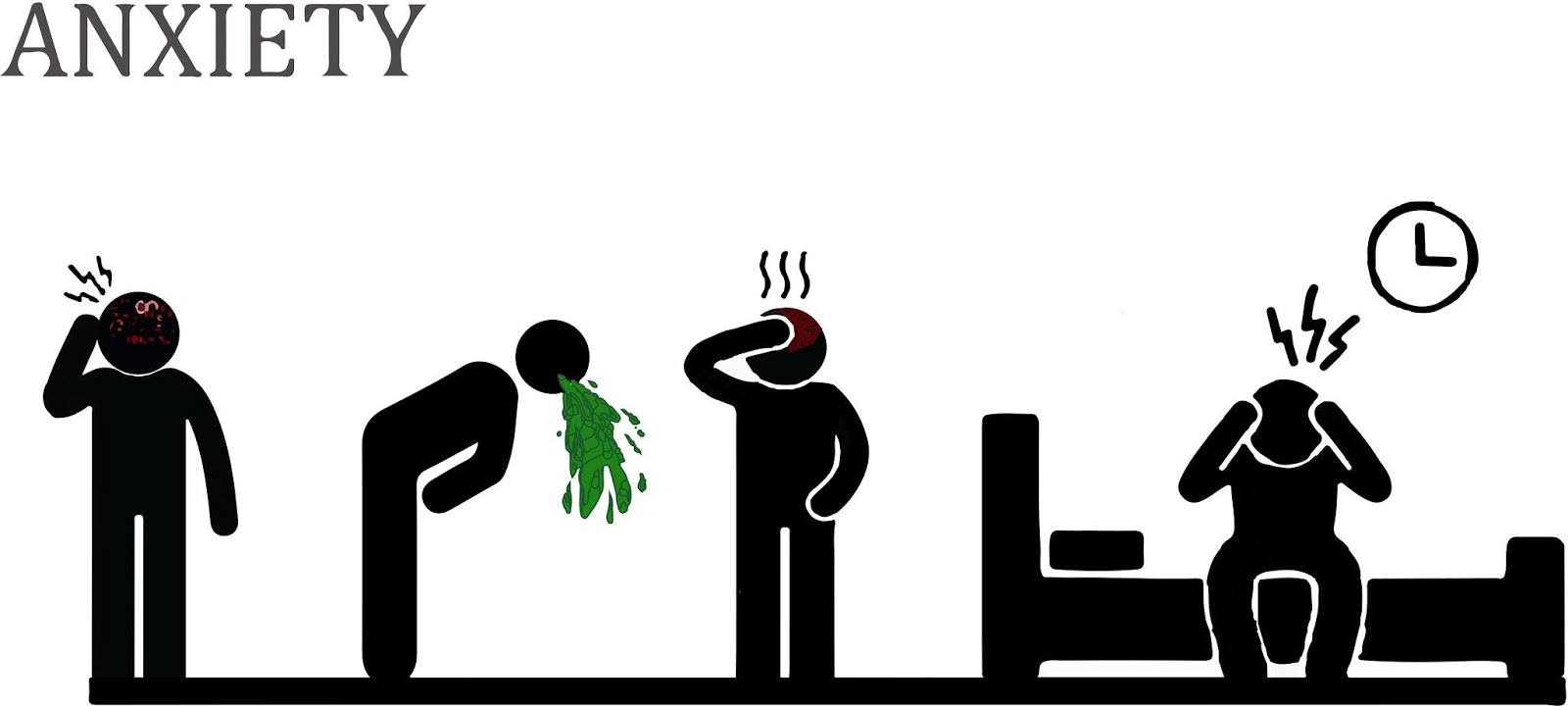In This Article
- CBD for Sleep: Is It Effective?
- CBD vs CBN for Sleep: Which is More Effective?
- CBD vs Melatonin for Sleep
- Ask a Budtender: What Are the Best CBD Products for Sleep?
- CBD Capsules and Pills
- CBD Edibles
- CBD Extracts
- CBD Flower
- CBD Tinctures and Transmucosal Sprays
- CBD Vapes
- What is the proper CBD dosage for sleep?
- When should I take CBD for sleep?
- Can CBD interact with sleep medication?
- Is CBD better than sleeping pills?
- Can I overdose on CBD?
- Will CBD get me high?
- Is CBD safe for children?
- Will CBD show up on a drug test?
- References
Getting enough sleep is important to maintaining a healthy relationship with your body. Research suggests that adults need between 7 to 9 hours of sleep per night to maintain good health. When an individual gets less than 7 hours of sleep, it is considered a short sleep duration. Adults who experience short sleep durations repeatedly may have an increased risk of decreased cognitive functioning, dementia, diabetes, heart disease, and death.
Poor sleep patterns can include sleep disorders like sleep apnea or the inability to stay asleep at night. Factors like technology, including cell phones and tablets, and socioeconomic stress, like finances, politics, or work, can contribute to shorter sleep duration in adults.1
Data collected on adults in the United States found that there was a 15% increase in adults getting six or fewer hours of sleep between 2004 and 2017. In 2020, the CDC Chronic Disease Indicators report stated that between 63.9% and 66.2% of adults are getting sufficient sleep.
In the years since the 2018 Farm Bill, the use of CBD for several ailments has grown in popularity, including individuals seeking to use CBD for sleep. One small survey study from 2021 found that 37% of individuals were using CBD for sleep improvement, and 24.6% were using CBD for self-reported insomnia.2
So, just how effective can CBD be for improving sleep? The research behind CBD for sleep provides valuable insights, even if they are limited. Other cannabinoids and natural supplements, like CBN and melatonin, also offer promise and warrant investigation.
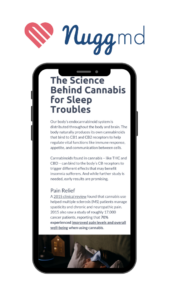
Fall asleep faster and wake up feeling more rested with our comprehensive (and completely free) patient’s guide to medical cannabis for sleep troubles.
CBD for Sleep: Is It Effective?
While insomnia is the most common sleep disorder, there are several disorders that involve disrupted sleep, which is linked to adverse emotional and physical effects. Encompassed under sleep disorders include but are not limited to:
- Hypersomnolence disorder. Characterized by recurrent periods of sleep within the same day, sleeping more than 9 hours without feeling rested, and difficulty being awake after an abrupt awakening, individuals with hypersomnolence often struggle with waking up and can become agitated.
- Insomnia. Insomnia involves having trouble getting to and staying asleep for at least three nights per week for three months.
- REM sleep behavior disorder. REM sleep behavior disorder is classified by sleep episodes associated with speaking and/or movement.
- Restless leg syndrome. Restless leg syndrome is characterized by an urge to move one’s legs, often involving a tingling, burning, or itching sensation, with symptoms occurring at least three times per week for three months.
So, does CBD help with sleep disorders?
Before taking a look at what the research says, it is important to acknowledge the potential impact of the endocannabinoid system on the body's sleep-wake functions and how cannabis may affect sleep via interaction with the CB1 receptors in the pons and basal forebrain, as well as their potential interaction with the serotonergic system.3,4 The serotonergic system is important in modulating the sleep-wake cycle, and CB1 receptors have been demonstrated to interact with the activation of this system.5
Clinical research on CBD and sleep disorders is limited, but it can reveal a few key points. First, is that in rat models, animals dosed with CBD had an increase in their total sleep percentage when given mid to high doses. The researchers note that higher doses of CBD caused an increase in REM latency, while mid-range doses resulted in a decrease in REM latency. This means that the higher the CBD dose, the quicker the onset of REM. More research is underway to assess the efficacy of CBD and other cannabinoids for insomnia, and no strong conclusions can be made from the available data.6
Like insomnia, research on REM sleep behavior disorder and CBD is limited. A small case series report from 2014 consisting of four individuals with Parkinson's who are experiencing REM sleep behavior disorder found that CBD did reduce related symptoms in those four individuals.7
A more recent study from 2021 conducted a clinical trial with 33 patients experiencing REM sleep behavior disorder and did not find any significant reduction in symptoms when compared to placebo,8 but the researchers noted that CBD was reported to significantly improve sleep satisfaction of participants between the 4th and 8th weeks of the clinical trial compared to placebo. Doses of CBD ranged from 75mg to 300mg per day to relieve symptoms.9
Unfortunately, no direct research on restless leg syndrome and CBD exists. However, a study from 2021 states that CBD may have an effect on restless leg syndrome, but more research is needed.10
Similarly, there is no clinical data on CBD for the treatment of hypersomnolence disorder, but one study from 2019 on rats points to the idea that CBD may help prevent sleepiness. However, it's well known that CBD can have different effects at different doses, so high doses of CBD may not be ideal for fighting off sleepiness, and instead, individuals may want to use smaller doses.11
CBD vs CBN for Sleep: Which is More Effective?
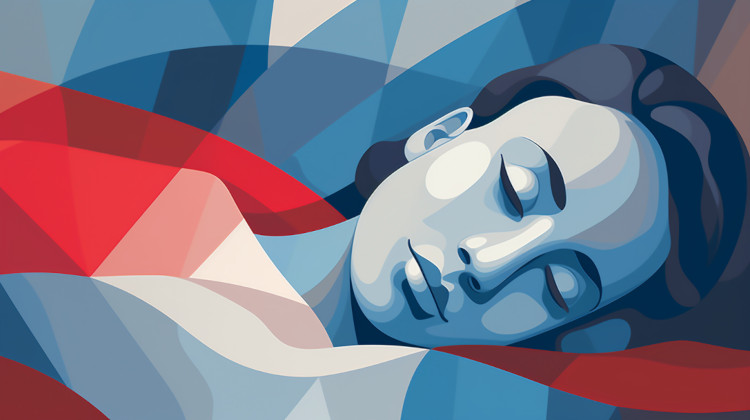
Cannabinol, CBN, has become a popular cannabinoid due to many companies and articles marketing it as a sleep aid. However, regarding CBN and its impact on sleep, there is limited clinical research that suggests it is helpful. CBN is produced naturally through the degradation of THC, which can occur due to light, heat, or oxygen exposure. CBN can also be synthetically made by converting CBD isolate using similar methods to the creation of delta-8 THC, which can also degrade into CBN if improperly stored.
Overall, research on CBN is minimal, but it is known to have a weaker binding affinity to the CB1 receptors than THC, making it less intoxicating. Research also indicates that it may have anticonvulsant properties, decrease heart rate and intestinal motility, and inhibit clotting.12
A study from 1975 found that 50mg of CBN had no effect and noted two other studies, one of which found that 400mg was also ineffective, but the other found 200𝜇g/kg given intravenously had an effect. This study from 1975 also found that individuals experienced enhanced intoxicating effects when given a combination of delta-9 THC and CBN vs. THC alone.13
When looking at CBD vs. CBN for sleep, CBD demonstrates more clinical evidence that it may improve sleep quality in high doses by providing relief from various sleep disorders such as REM sleep behavior disorder, insomnia, hypersomnolence disorder, and restless leg syndrome.
CBD vs Melatonin for Sleep
Melatonin is a hormone produced by the brain when the eyes are exposed to darkness. When the eyes are exposed to light at night it can hinder the production of melatonin and disrupt the body's natural circadian rhythm.
Individuals can take supplemental melatonin to help promote sleep, but it doesn’t necessarily guarantee sleep. A meta-analysis published in 2018 reported that across 19 studies and 1683 participants, melatonin reduced the time to get to sleep and increased total sleep time significantly compared to placebo. The studies included in this meta-analysis looked at patients with insomnia, delayed sleep phase syndrome, and REM sleep behavior disorder. However, some limitations of this meta-analysis include small sample sizes and a lack of studies on sleep disorders other than insomnia. While melatonin may show promise in helping relieve the symptoms of sleep disorders, more clinical research is needed to assess its efficacy.
Based on this data and what is known about clinical trials on CBD for sleep, it may not be CBD vs. melatonin, as they both have demonstrated clinical evidence supporting their use for sleep disorders. Instead, the use of these compounds together may help to relieve symptoms of sleep disorders such as insomnia, REM sleep behavior disorder, restless leg syndrome, and hypersomnolence disorder. However, there is limited clinical data exploring the subject.
One small trial of 20 participants with anxiety or poor sleep published in 2022 found that a combination of 1.5mg melatonin and 2.5mg CBD positively affected sleep quality and reduced anxiety symptoms.14 Overall, more research is needed to determine the efficacy of using both cannabis and melatonin to help with sleep disorders.
Ask a Budtender: What Are the Best CBD Products for Sleep?
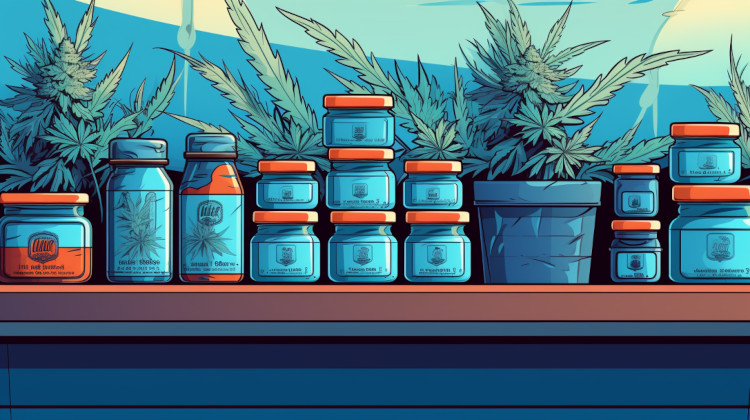
CBD Capsules and Pills
CBD capsules and pills are formulated using cannabis extract. The cannabinoid extract can be placed into a gel capsule or pressed into a pill form that can then be absorbed via ingestion or under the tongue. This method of use is a highly discreet and easy way to consume cannabis.
Many medical cannabis patients point new consumers to the CBD Protab from Level, with 25mg of CBD per dose. This product comes in a pill form that is not dissolvable under the tongue and will need to be ingested and absorbed in the same fashion as an edible, so it may take up to two hours for an individual to feel an effect.
Another product we’ve seen highlighted in patient product reviews is the Papa & Barkley CBD sleep capsule line, consisting of capsules with varying CBD strengths; one has capsules containing 30mg CBD, and the other has 60mg CBD per capsule.
CBD Edibles
CBD edibles for sleep are a growing market, and they also can be discreet, depending on the packaging. Cannabis edibles can come in a variety of forms, from gummies, chocolate, and chews to cookies and drinks. These products are absorbed via the liver and, similar to THC edibles, may take a while to produce an effect. Here is a short list of CBD edible products that consumers have felt helped their sleep troubles.
The first edible product is Mr. Moxey’s Dream Lavender Mints. Made with a 3:1 ratio of CBD to THC, these Dream Lavender mints from Mr. Moxey’s are also made with a blend of valerian root and passion flower. These herbs have historically been used to help promote stress relief and sleep and are the perfect addition to this cannabinoid ratio.
Next, the Sleep Cordial elixir from Koan contains around 5mg THC, 15mg CBD, and 10mg CBN per bottle and can be used alone or mixed into a beverage. This sleep blend elixir is also infused with myrcene and linalool, which are both indicated by research and anecdotal reports to help promote sleep and relaxation.
CBD Extracts
CBD extracts are made in the same fashion as THC extracts, but instead, they use high-CBD cannabis flower, commonly known as hemp. In some recreational and medical markets, you can find a variety of high-CBD extracts ranging from shatter and crumble to live resin and live rosin.
CBD isolate makes up a large portion of the extract market because it contains an undetectable amount of THC. While we don’t recommend CBD extracts sold outside the licensed recreational or medical market, they may be available. However, you can locate high-CBD extracts at recreational or medical dispensaries in your state; just ask your budtender!
CBD Flower
CBD flower, or hemp, has been produced in mass quantities since the passing of the 2018 Farm Bill. With a wide array of CBD flower products between the legal recreational, medical, and general markets, it can take time to sort through and select the best strains for sleep. The effects of CBD flower can be felt quickly since the body absorbs cannabinoids directly through the lungs. So, smoking flower is a great way to get fast results.
However, not all cultivars are as effective in supporting quality sleep, and some strains may make it harder to fall asleep.
One high-CBD flower on the market patients have found relief with is the 1:1 Gush Mints from Coastal Sun. Gush Mints is typically known by consumers as having a more sedating effect with its combination of terpenes and cannabinoids.
CBD Tinctures and Transmucosal Sprays
CBD tinctures and sprays are intended to be used sublingually, to be absorbed quickly under the tongue or through the gums. This absorption method brings on effects at a similar rate to that of cannabis inhalation, but there is a chance that some of the tincture or spray is ingested and may take longer to have an effect.
For tinctures, we recommend Yummi Karma High CBD Beauty Sleep Drops. This high CBD tincture is marketed as a “nighttime soother” to induce relaxation and help promote restful sleep. This Beauty Sleep tincture should be taken under the tongue for the best and quickest results.
CBD Vapes
Like CBD flower, CBD vapes are inhalable cannabinoid products with a quick onset time. Individuals should avoid CBD vape pens that are found outside the recreational or medical cannabis markets to prevent adverse side effects and exposure to unknown byproducts and compounds that are often found in non-dispensary vape pens. If you live in a state without a licensed cannabis market, look for products from reputable brands that offer a certificate of analysis (CoA) from an independent laboratory to verify their ingredients and safety.
A popular consumer choice for a CBD vape pen is the Dreamt Disposable Vape. While this product is considered a high THC product, with 250mg of THC per vape pen, it also has 100mg of CBD. This disposable vape pen is formulated with melatonin, valerian root, and certain terpenes that may help promote sleep and relaxation. Because inhalation is the quickest method of absorption for cannabinoids, this product is at the top of many patients’ lists for efficiency.
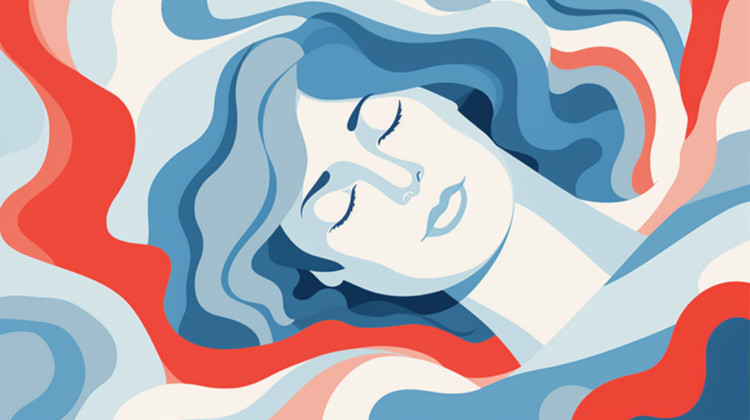
What is the proper CBD dosage for sleep?
Based on the data available to us from clinical research studies, a CBD dose of between 75mg and 300mg may help relieve symptoms.8 Research recommends to start low at around 2.5mg or 5mg and gradually increase as needed from there. However, each individual has a unique endocannabinoid system, so it is best to consult with your doctor before introducing CBD to your evening routine.
When should I take CBD for sleep?
Individuals who use CBD edibles, drinks, capsules, or non-dissolvable tablet pills may feel the effects of CBD approximately two hours after use. Other methods of absorption, such as sublingual or inhalation, have a much quicker onset, and individuals may feel the effects of products like sprays, dissolvable pills, vape pens, and flower up to 15-45 minutes after use.15 Speaking with your doctor about adding CBD to your evening routine can help you find the most effective dosage and timing.
Can CBD interact with sleep medication?
Some sleep medications may interact with CBD as the same CYP450 enzymes metabolize them.16 Individuals should consult a doctor if they are taking any prescription medications before starting a CBD regime.
Is CBD better than sleeping pills?
It is unclear if CBD is better for sleep than standard pharmaceutical medications. More clinical research is needed before concluding which is more effective for sleep disorders. This is especially true for products that haven't been studied, like CBD pillows.
Can I overdose on CBD?
In short, you can not overdose on CBD as the amount needed to reach toxic levels is upwards of 20,000mg of CBD. An individual is more likely to get sick from taking too much of a tincture made with MCT oil or eating too many gummies or sugary edibles.
Will CBD get me high?
No, CBD is a non-intoxicating cannabinoid that does not interact with the CB1 receptors the way delta-9 THC does to produce an intoxicating effect. While CBD is not intoxicating like THC, it is still a psychoactive cannabinoid like THC because it acts on receptors within the brain, such as the 5-HT receptors. However, in individuals sensitive to THC, full-spectrum CBD products may result in an intoxicating effect when taken in high amounts over a short period.
Is CBD safe for children?
CBD is generally regarded as safe when used in children, though the FDA has expressed some concern over the potential for liver toxicity. It is important to note that these clinical studies were done with children who had been diagnosed with certain medical conditions, such as autism spectrum disorder, fragile X syndrome and epilepsy.17,18 The FDA has also approved Epidiolex, a CBD product intended to treat children with Lennox-Gastaut Syndrome.19
Will CBD show up on a drug test?
It's possible that CBD may be detected on a drug screening. For CBD to be detected on a drug test, it depends on several factors. One of these factors is what metabolites the laboratory is looking for and at what levels. Most drug tests look for THC metabolites, so theoretically, CBD wouldn't be detected,
That's why it's important to determine if the CBD product contains a significant level of THC. It'd also matter how often an individual consumes it. The more cannabis an individual uses, the higher the cannabinoid metabolite levels will be. Not all CBD products are guaranteed to be THC-free, and caution is advised when taking products made with any cannabinoid.
References
- Sheehan CM, Frochen SE, Walsemann KM, Ailshire JA. Are U.S. adults reporting less sleep?: Findings from sleep duration trends in the National Health Interview Survey, 2004–2017. Sleep. 2018;42(2). doi:https://doi.org/10.1093/sleep/zsy221
↩︎ - Moltke J, Hindocha C. Reasons for cannabidiol use: a cross-sectional study of CBD users, focusing on self-perceived stress, anxiety, and sleep problems. Journal of Cannabis Research. 2021;3(1). doi:https://doi.org/10.1186/s42238-021-00061-5 ↩︎
- Kesner AJ, Lovinger DM. Cannabinoids, Endocannabinoids and Sleep. Front Mol Neurosci. 2020;13:125. Published 2020 Jul 22. doi:10.3389/fnmol.2020.00125
↩︎ - De Gregorio D, McLaughlin RJ, Posa L, et al. Cannabidiol modulates serotonergic transmission and reverses both allodynia and anxiety-like behavior in a model of neuropathic pain. Pain. 2019;160(1):136-150. doi:10.1097/j.pain.0000000000001386 ↩︎
- Haj-Dahmane S, Shen RY. Modulation of the serotonin system by endocannabinoid signaling. Neuropharmacology. 2011;61(3):414-420. doi:10.1016/j.neuropharm.2011.02.016 ↩︎
- Kaul M, Zee PC, Sahni AS. Effects of Cannabinoids on Sleep and their Therapeutic Potential for Sleep Disorders. Neurotherapeutics. 2021;18. doi:https://doi.org/10.1007/s13311-021-01013-w
↩︎ - Chagas MHN, Eckeli AL, Zuardi AW, et al. Cannabidiol can improve complex sleep-related behaviours associated with rapid eye movement sleep behaviour disorder in Parkinson’s disease patients: a case series. Journal of clinical pharmacy and therapeutics. 2014;39(5):564-566. doi:https://doi.org/10.1111/jcpt.12179
↩︎ - Ferracioli-Oda E, Qawasmi A, Bloch MH. Meta-Analysis: Melatonin for the Treatment of Primary Sleep Disorders. FOCUS. 2018;16(1):113-118. doi:https://doi.org/10.1176/appi.focus.16101
↩︎ - de Almeida CMO, Brito MMC, Bosaipo NB, et al. Cannabidiol for Rapid Eye Movement Sleep Behavior Disorder. Movement Disorders: Official Journal of the Movement Disorder Society. 2021;36(7):1711-1715. doi:https://doi.org/10.1002/mds.28577 ↩︎
- Leehey MA, Liu Y, Hart F, et al. Safety and Tolerability of Cannabidiol in Parkinson Disease: An Open Label, Dose-Escalation Study. Cannabis Cannabinoid Res. 2020;5(4):326-336. Published 2020 Dec 15. doi:10.1089/can.2019.0068
↩︎ - Murillo-Rodríguez E, Millán-Aldaco D, Palomero-Rivero M, Morales-Lara D, Mechoulam R, Drucker-Colín R. Cannabidiol Partially Blocks the Excessive Sleepiness in Hypocretindeficient Rats: Preliminary Data. CNS Neurol Disord Drug Targets. 2019;18(9):705-712. doi:10.2174/1871527318666191021143300 ↩︎
- Grotenhermen F, Russo E, eds. Cannabis and Cannabinoids: Pharmacology, Toxicology, and Therapeutic Potential. The Haworth Integrative Healing Press; 2003:40-343240-3432. doi:https://doi.org/10.5860/choice.40-3432 ↩︎
- Karniol IG, Shirakawa I, Takahashi RN, Knobel E, Musty RE. Effects of Δ9-Tetrahydrocannabinol and Cannabinol in Man. Pharmacology. 1975;13(6):502-512. doi:https://doi.org/10.1159/000136944 ↩︎
- Palmieri G, Vadalà M, Corazzari V, Palmieri B. Insomnia treatment: a new multitasking natural compound based on melatonin and cannabis extracts. La Clinica Terapeutica. 2022;173(1):91-96. doi:https://doi.org/10.7417/CT.2022.2399
↩︎ - MacCallum CA, Russo EB. Practical considerations in medical cannabis administration and dosing. European Journal of Internal Medicine. 2018;49(49):12-19. doi:https://doi.org/10.1016/j.ejim.2018.01.004 ↩︎
- Balachandran P, Elsohly M, Hill KP. Cannabidiol Interactions with Medications, Illicit Substances, and Alcohol: a Comprehensive Review. J Gen Intern Med. 2021;36(7):2074-2084. doi:10.1007/s11606-020-06504-8 ↩︎
- Dias-de Freitas F, Pimenta S, Soares S, Gonzaga D, Vaz-Matos I, Prior C. The role of cannabinoids in neurodevelopmental disorders of children and adolescents. El papel de los cannabinoides en los trastornos del neurodesarrollo de niños y adolescentes. Rev Neurol. 2022;75(7):189-197. doi:10.33588/rn.7507.2022123 ↩︎
- Aran A, Cayam-Rand D. Medical Cannabis in Children. Rambam Maimonides Med J. 2020;11(1):e0003. Published 2020 Jan 30. doi:10.5041/RMMJ.10386
↩︎ - Abu-Sawwa R, Stehling C. Epidiolex (Cannabidiol) Primer: Frequently Asked Questions for Patients and Caregivers. J Pediatr Pharmacol Ther. 2020;25(1):75-77. doi:10.5863/1551-6776-25.1.75 ↩︎
The information in this article and any included images or charts are for educational purposes only. This information is neither a substitute for, nor does it replace, professional legal advice or medical advice, diagnosis, or treatment. If you have any concerns or questions about laws, regulations, or your health, you should always consult with an attorney, physician or other licensed professional.

